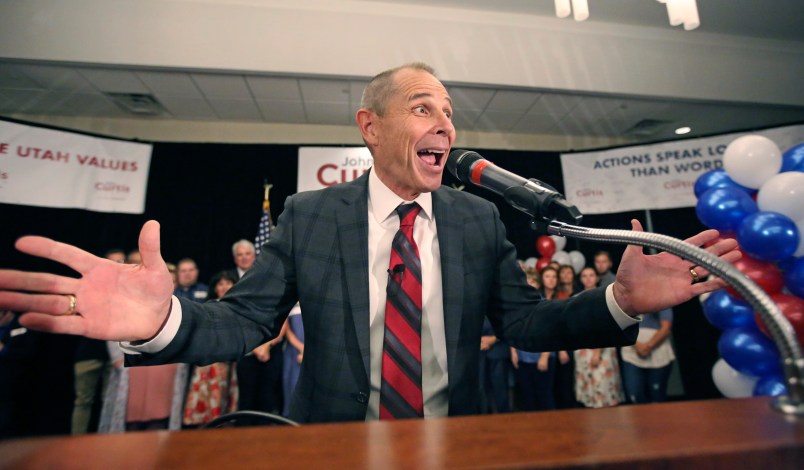SALT LAKE CITY (AP) — A Utah mayor overcame nearly $1 million in attacks from out-of-state groups to win a three-way Republican primary in a race to fill a seat in the U.S. House of Representatives vacated by Jason Chaffetz.
Tuesday’s win puts Provo Mayor John Curtis on an easy path toward victory in the November special election. Republicans outnumber Democrats 5-to-1 in Utah’s 3rd Congressional District. Chaffetz represented the district until he abruptly resigned in June, citing a desire to spend more time with family.
Utah’s special election is one of seven this year to fill vacancies in the U.S. House and Senate, five of which opened up when elected officials took posts in President Donald Trump’s administration.
Chaffetz, a five-term Republican, carved out a reputation for using the House Oversight committee he chaired to run aggressive investigations of Hillary Clinton before the 2016 presidential elections. He’s since taken a role as a Fox News commentator.
His departure opened up a congressional seat in an area that stretches from the Salt Lake City suburbs and several ski towns southeast to Provo and coal country.
The three Republicans running to replace him carved out nuanced stances toward Trump that were emblematic of the divisions roiling the GOP under the president.
Curtis, who drew support from the GOP’s more moderate flank, was the only candidate who didn’t vote for Trump, saying he had significant moral concerns about supporting the billionaire businessman.
Tanner Ainge, the Sarah Palin-endorsed son of Boston Celtics president Danny Ainge, said he voted for Trump because he always votes for the Republican candidate in presidential elections.
Chris Herrod, a former state lawmaker backed by Texas Sen. Ted Cruz, was the most vocal supporter of Trump, having spoken at a rally for the president.
However, all three candidates said they support the president’s agenda, including plans to build a wall along the U.S.-Mexican border and repeal the Affordable Care Act.
Unofficial results show Curtis as the victor after his opponents split support from more conservative Republicans.
The 57-year-old used his victory speech Tuesday to decry the heavy outside spending, which usually isn’t seen in primary races in overwhelmingly Republican Utah.
“I’ve got a message to those PACs in Washington, D.C. and those special interests: This is my town, this is my district. Go home. You wasted your money,” Curtis said.
As supporters erupted into cheers at his Provo election night party, Curtis said in a phone interview with The Associated Press that his victory showed that voters liked his positive campaign.
“It was Utah-based, Utah-principled, Utah-endorsed. That’s what they want,” Curtis said. “They didn’t like the negativity.”
Herrod, a 51-year-old known for strict immigration positions, wasn’t ready to concede Tuesday night, holding out hope for tens of thousands of ballots not yet counted in the county with the most voters.
Ainge, a 33-year-old first-time candidate, conceded earlier in the evening and said he was glad the district would be represented by someone with a business background like Curtis.
Curtis was known as mayor for helping to negotiate a deal for Google to take over the city’s troubled fiber-optic system. But he was dogged in the primary by questions about whether he was really a Republican, having led a county Democratic party and run in 2000 as a Democrat for the state Legislature.
Curtis has said he had a “fling on the dark side,” but noted that Ronald Reagan, Trump and Chaffetz were all Democrats at one point.
Ada Wilson, a 59-year-old Republican homemaker from Orem, said Curtis’ stint across the aisle was one of the reasons she voted for him. Wilson said it shows Curtis can work in a bipartisan way to get things done.
“I think he acknowledges that being Republican with an ‘R’ by your name does not automatically make you a keeper of all the answers,” she said.
David Muir, the city treasurer for the Salt Lake City suburb of Cottonwood Heights, said he voted for Curtis because of his experience running a city and that he wasn’t worried about Curtis’ Democratic past.
Curtis’s win marked another key test of Utah’s relatively new dual-track system for nominating political candidates, which allows candidates to bypass a conservative group of GOP delegates and instead compete for the votes of a larger, more moderate group of Republicans.
Several hundred GOP delegates backed Herrod, which allowed him to advance to the primary election. Curtis and Ainge earned their spots on the ballot by collecting voter signatures. The system was added after then-Sen. Bob Bennett, a longtime Republican, lost re-election in 2010 to tea-party backed Mike Lee.
Curtis moves on to face a well-funded Democratic opponent who initially announced her intent to challenge Chaffetz in 2018 but now is a candidate in November’s special election. Dr. Kathryn Allen socked away more than half a million dollars after she called out Chaffetz earlier this year for his comments suggesting people should spend money on health care instead of iPhones.
Allen released a statement late Tuesday congratulating Curtis and vowing to keep her campaign positive.
Several third-party candidates are also running in November, including Jim Bennett, the son of the late former Sen. Bob Bennett.
Jim Bennett, the first candidate of a new centrist United Utah Party, congratulated Curtis but said in a statement that as a good man, Curtis should feel uncomfortable in the “Party of Trump.”









